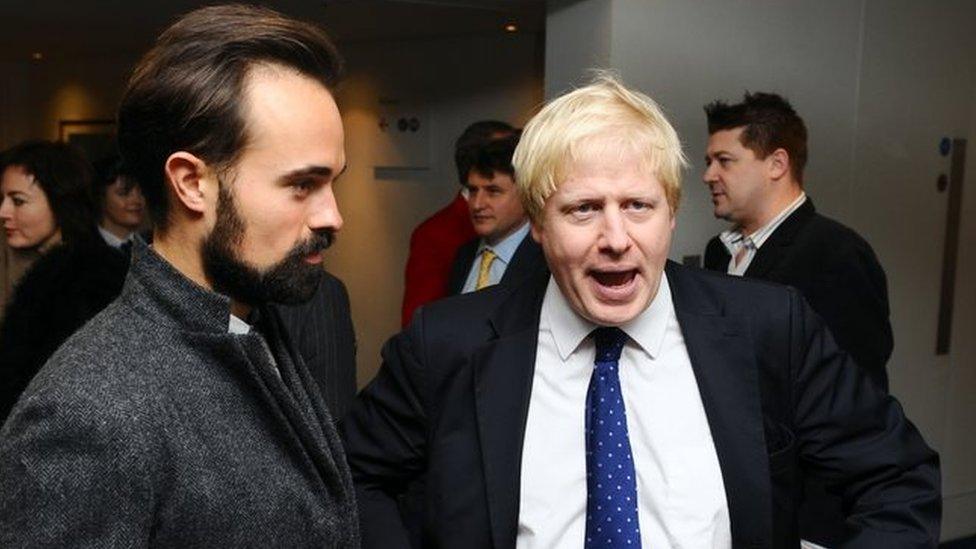MPs vote to back publication of Lord Lebedev peerage security advice
- Published

Lord Lebedev is a longstanding friend of the prime minister
The government will have to publish confidential information on how Evgeny Lebedev got a seat in the Lords, after a Parliamentary move from Labour.
Boris Johnson has denied overruling security service concerns about giving the Russian-born media mogul a peerage.
The government argued against making the security advice public, accusing the opposition of being anti-Russian.
But the motion was passed unopposed, and the government now has until 28 April to release the documents.
The documents relate to the decision to grant Lord Lebedev a seat in the UK Parliament.
Lord Lebedev, the son of a former KGB agent, owns the Independent and London Evening Standard newspaper. He became a non-party, crossbench peer in July 2020, after being nominated by Mr Johnson.
Labour says the House of Lords Appointment Committee (HOLOC), the committee that vets peerages, advised the prime minister against giving Evegeny Lebedev a seat in the Lords on security grounds, but later changed its advice.
Labour's deputy leader Angela Rayner told MPs: "It's time for the prime minister to come clean today on if, and why, he interfered with British intelligence to award a peerage to his close personal friend."
She claimed Mr Johnson was "willing to jeopardise the security of the British public for the sake of a personal friendship" and accused him riding roughshod over the Lords appointments process.
Lord Lebedev has denied posing a "security risk" to the UK and he backed the publication of the security advice, tweeting: "I have nothing to hide."
Ms Rayner demanded to know what happened between Mr Johnson receiving the HOLOC advice and the peerage being cleared, highlighting a private meeting between Lord Lebedev and Mr Johnson at the peer's London home.
Angela Rayner says there are "serious allegations" about a peerage for Evgeny Lebedev despite warnings over national security.
Paymaster General Michael Ellis, for the government, condemned what he called Labour's "unsavoury" personal attacks on Lord Lebedev.
He said Lord Lebedev was a "British citizen who happens to be of Russian extraction", who had raised a lot of money for charity through his newspapers.
He rejected Labour's call to publish the security advice to HOLOC, "even if Lord Lebedev says he doesn't mind", because, he said, confidentiality was needed to protect the integrity and independence of the appointments system.
Labour used a Humble Address motion, an obscure Parliamentary procedure employed by the party to get hold of Brexit material in 2017, to force the publication of the the confidential documents.
Tory MPs were ordered not to take part in the vote. Mr Ellis denied claims this was because the government feared it would be defeated by Tory rebels who also want to see the material published, claiming it was normal for Tories to abstain in votes on Labour motions.
The Labour motion calls for the publication of all documents held by the prime minister's private office or the Cabinet Office about advice from, or provided to, HOLAC relating to Lord Lebedev's peerage.
Many British citizens of Russian extraction came to the UK to oppose President Putin, Michael Ellis tells the Commons.
The motion also demands the publication of all relevant emails and the minutes of any meetings at which the peerage was discussed, but is not clear how much of the material will be redacted on national security grounds.
As the Commons debate began, Lord Lebedev tweeted: "Openness and transparency are pillars of our democratic system, so I welcome the call for security advice about me provided to HOLAC to be released."
He also suggested Labour should not be debating his peerage amid a war in Europe and rising living costs - and claimed Labour leader Sir Keir Starmer had sent him a congratulatory text when he was made a peer.
Labour MP Ben Bradshaw said it was "completely unacceptable" for a member of the Lords to comment on Commons proceedings in this way, adding that in Lord Lebedev's case it was also "extremely unwise". Deputy Speaker Eleanor Laing defended Labour's right to hold a debate on the issue.
Mr Ellis said Lord Lebedev's claim that Sir Keir congratulated him on his peerage was "embarrassing" for Labour, but the SNP's Pete Wishart said Mr Ellis was just trying to throw up a "smokescreen to protect his beleaguered prime minister".
Boris Johnson is known to have been aware of security service concerns about granting Lord Lebedev a seat in the UK's Parliament.
Former No 10 adviser Dominic Cummings has said he was "in the room" when the prime minister was told intelligence officials had "serious reservations" about the move. Another source has confirmed to the BBC that concerns were raised by security services.